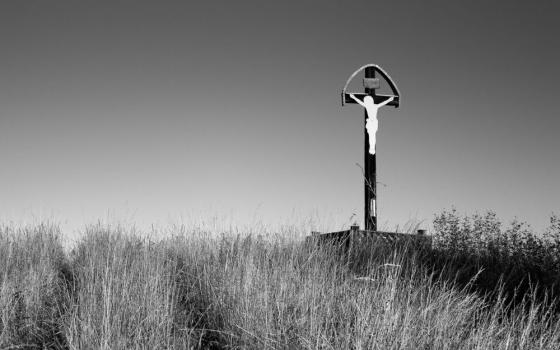
Cardinal Pierbattista Pizzaballa, the Latin patriarch of Jerusalem, in red, takes part in the traditional path that Jesus took on his last entry into Jerusalem during the Palm Sunday procession on the Mount of Olives April 13, 2025. (OSV News/Debbie Hill)
For the second year in a row, few foreign pilgrims were in attendance at the traditional Palm Sunday procession from the Mount of Olives into the Old City of Jerusalem due to the ongoing Israel-Hamas war in the Gaza Strip. But even the gray skies that threatened rain didn't dampen the spirit of the 4,000 participants.
Most of them were Christians from Jerusalem and the Galilee, as well as a few Christians from the West Bank, foreign diplomats and NGO employees, members of religious orders and foreign workers. Ethiopian Orthodox pilgrims, with their traditionally embroidered-trimmed white gowns, also took part in the procession, as in 2025 the festivals of all the Orthodox and Catholic churches converge.
Some 6,000 initial travel permits were issued for West Bank Christians to attend Holy Week celebrations, with an additional 2,000 expected later in the week but not yet confirmed, according to the Latin Patriarchate of Jerusalem.
Sheltering from the rain under a doorway, Batrice Batrice, a Catholic from Nazareth, said he had brought his three teenage children, his wife and his aunt to take part in the procession this year, knowing that it would not be as joyous as other years, because he thought it was important to maintain hope and a positive attitude.
"It was happier when there were many pilgrims here. Ten years ago these roads were full of people," he said. "We always have to keep hope alive and believe that the situation will be better. There is always someone up there watching out for us."
Amid bursts of rain, the pilgrims were led by the Christian scouts troop, who again this year did not play their marching band instruments but sang hymns and clapped their hands. The pilgrims waving palm fronds wound their way down from Bethphage — a Franciscan church located on the Mount of Olives in Jerusalem — down to the Monastery of the Ascension and downhill to Gethsemane garden, concluding at the Church of St. Anne by the Lion's Gate in the Old City.
Members of various Neocatechumenal Way communities played guitar and sang as they marched in the procession adding a bit of festivity to the event, a group of Franciscan friars played music and sang, and members of the Filipino Catholic community sang songs.
"We are still rejoicing," said Violeta Pasco, a Filipino caretaker who works in Tel Aviv and came to Jerusalem with her husband and 15-year-old daughter. "Even when it is difficult we need to rejoice. No one will stop us from rejoicing. It is our faith."
The day began with the palm procession and Pontifical Mass in the Church of the Holy Sepulcher where Latin Patriarch Cardinal Pierbattista Pizzaballa blessed the palm fronds, and a procession walked around the edicule during the Pontifical Mass. The Holy Edicule is raised over the place of Christ’s tomb. Greek Orthodox and Copt faithful also filled the church as they celebrated Palm Sunday.
In his Palm Sunday procession message, Pizzaballa urged the faithful to remember "what matters most" despite the continuing difficulties: "We are here today, local Christians and pilgrims, all together, to say strongly that we are not afraid. We are the children of light and resurrection, of life. We hope and believe in the love that overcomes everything."
"We have encountered Him. And we are here to cry it out, strongly, confidently, and with all the love we can, which no one can ever extinguish. No one will separate us from our love for Jesus. And we want to witness it first of all with unity among ourselves, loving and supporting one another, forgiving one another," he said. "As I keep repeating, we belong to this city and no one can separate us from our love for the Holy City, just as no one can separate us from the love of Christ."
Advertisement
"I think it is just important to always keep hope no matter what the situation is. On these special holy times, we need to focus ever more so on hope," said Janice Stepp from Florida, who admitted that she and her family felt a bit of trepidation before she came. Once in the Holy Land, however, she had calmed down and had been amazed by the unique opportunities for prayer and contemplation.
"What we see in the news is very much exaggerated. I feel it is safe to visit here, and we have been everywhere. We got as much time as we wanted in the Church of the Nativity by the star where Jesus was born. It was an amazing opportunity," she told OSV News.
Stepp said her group also made purchases from Christian shop owners in Bethlehem to help support the local Christian community.
"According to the Bible, Jesus came to Jerusalem during this period to free the people and get closer to God," said Ramze Shaheen, a resident of the Old City. "Today, 2000 years later, we are not asking for peace. Just quiet. There won't be peace now after all that has happened, but we hope and pray for quiet so we can live together and educate our children."
Meanwhile, the Diocese of Jerusalem of the Episcopal Church in Jerusalem and the Middle East issued a statement condemning the early April 14 morning bombing of their Ahli Arab Hospital in Gaza, run by the Anglican Church in Jerusalem, which was the last fully functioning hospital in Gaza City.
They said the twin strikes had demolished the two-story genetic laboratory and damaged the pharmacy and emergency department building as well as the church building of St. Philip.
They said the IDF had issued a warning to evacuate the building only 20 minutes before the airstrike. It is the fifth time the hospital has been bombed since the start of the war. The IDF, which maintains that Hamas uses hospitals and schools as a shield for their operatives and weapons, said they had struck Hamas targets in the attack.
The head of the International Committee of the Red Cross (ICRC) has told the BBC that Gaza has become "hell on earth" as Israel's military assault there continues.
Mirjana Spoljaric's comments come on the same day the U.N. human rights office warned that Israel's tactics were threatening the viability of Palestinians continuing to live in Gaza at all, the BBC said.
The U.N. also said 15 Palestinian paramedics and rescue workers in the Gaza Strip were killed by Israeli forces "one by one" March 23 and buried in a mass grave in southern Gaza. The IDF has confirmed that troops from Golani, one of the army’s five infantry brigades, opened fire on two convoys of ambulances in Rafah. The bodies have since been retrieved by a U.N. team.
More than 1,500 people have been killed in Israeli bombardment since it renewed the war on March 18, the Hamas-run health ministry in Gaza said.
In an interview with the Italian Tg2000 news program, Pizzaballa called the situation in Gaza "dramatic, catastrophic, shameful," one where the dignity of the 2.3 million people living there is not being taken into consideration.
"We cannot think that they are all complicit with terrorism or crime," he said. "We must be open to all perspectives, keeping our attention high, but also that of all the churches around the world, of everyone willing to listen to us, on the seriousness of what is happening."
He said he had spoken briefly to Father Gabriel Romanelli, the priest at Holy Family Parish in Gaza, who said the Catholic families sheltering in the church are determined to remain until the end of the war.
"Then, only God knows what may happen, so we must also be very realistic," the patriarch said in the interview.







